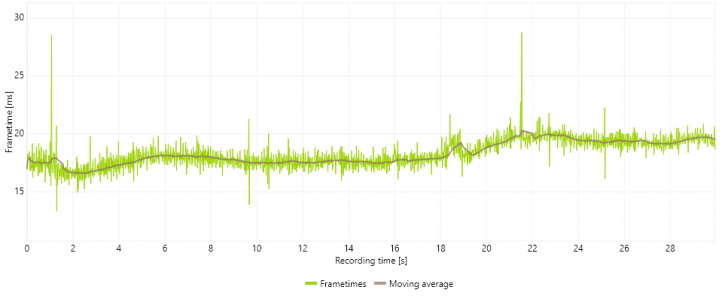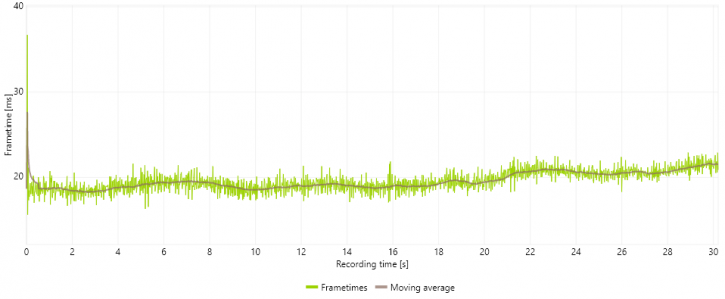Game Frametime Analysis
Frametime and latency performance
The charts below will show you graphics anomalies like stutters and glitches in a plotted chart. Frame time and pacing measurements.
| Frame time in milliseconds |
FPS |
| 8.3 | 120 |
| 15 | 66 |
| 20 | 50 |
| 25 | 40 |
| 30 | 33 |
| 50 | 20 |
| 70 | 14 |
- FPS mostly measures performance, the number of frames rendered per passing second.
- Frametime AKA Frame Experience recordings mostly measure and expose anomalies - here we look at how long it takes to render one frame. Measure that chronologically and you can see anomalies like peaks and dips in a plotted chart, indicating something could be off.
We have a detailed article (read here) on the methodology behind it all. Basically the time it takes to render one frame can be monitored and tagged with a number, this is latency. One frame can take say 17 ms. Higher latency can indicate a slow framerate, and weird latency spikes indicate a stutter, jitter, twitches; basically, anomalies that are visible on your monitor. What these measurements show are anomalies like small glitches and stutters that you can sometimes (and please do read that well, sometimes) see on screen. Below I'd like to run through a couple of titles with you. Bear in mind that Average FPS often matters more than frame time measurements.
Please understand that a lower frame time is a higher FPS, so for these charts, lower = better. Huge spikes would be stutters, thick lines would be bad frame pacing, and the graduate streamlining is framerate variation.
As you might have observed, we're experimenting a bit with our charts and methodology. Below the following five games at 2560x1440 (Ultra HD), with image quality settings as used throughout this review. The frame times plot also showing the 1% low FPS, as well as a 95th percentile FPS in the tested resolution.
For reasons of time, two plots from two cards in the same performance ranges. tested at ultra quality settings:
Above the GeForce RTX 2070 SUPER. Very clean behavior a few spikes (two) but we're not passing 40ms here, so that's all good.
Above you can see the Radeon RX 5700 XT, a beautiful plot really. If you think that's a lot of frame variation, it's not. We plot at 30 to 40ms these days. So this is very smooth behavior.



